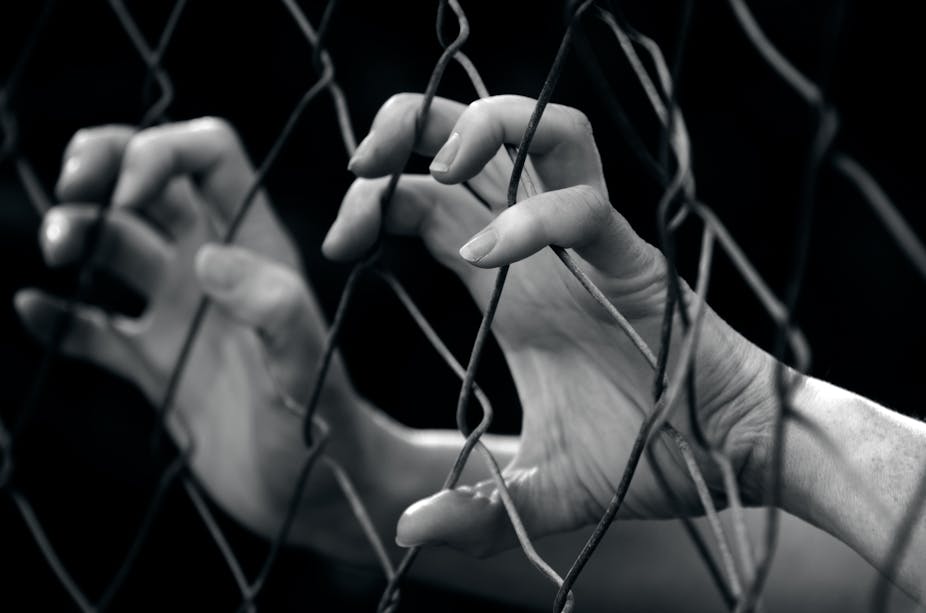The NSW Community Relations Commission today released a report which found the NSW government is failing to adequately acknowledge or respond to reports of human trafficking and slavery.
While many in the community think of a trafficked person as a woman working in sexual servitude, the report found that human trafficking and slavery affects men, women and children.
Exploitation through trafficking and forced labour occurs in many industries including hospitality, agriculture and factory work. Some victims are criminally exploited in private homes; others are subjected to forced marriage.
Recent cases
Over the last few weeks and months, media reports of people experiencing such exploitation worldwide have put a spotlight on slavery, human trafficking and practices such as forced marriage and forced labour.
There were distressing reports of a high profile case in the United Kingdom where three women were allegedly held in slavery or slavery like-conditions for 30 years in an ordinary house in an ordinary residential area.
While the facts of the case are still unclear and highlight difficulties in understanding the dimension of abuse – particularly in private domestic settings – the police said that the women were controlled by “invisible handcuffs” demonstrating a “complicated and disturbing picture of emotional control”.
Back in Australia, the ABC reported in July on the case of a group of Filipino boxers who were trafficked to Sydney. It was alleged the boxers’ passports were confiscated and they were prevented from leaving until their debts were paid off. They lived in substandard conditions in a small garage and were given food scraps for meals.
As a result of investigation, the Australian Federal Police charged three members of a family with people-trafficking offences. The case has not yet been heard.
In an earlier Australian case, a couple were charged and convicted of slavery offences involving the trafficking of a vulnerable Filipina woman to Australia to work in their takeaway food shop and as a domestic worker for their family. The woman worked in the family’s takeaway food shop and the family’s home in a Queensland country town every day for up to 18 hours a day.
After work, she returned to the family’s home, cleaned and looked after the couple’s three children and undertook other household duties. She was paid very little and was further abused. Eventually she escaped, leading to an investigation by police and charges and convictions of slavery offences.
Putting an end to slavery
New laws introduced by the Commonwealth earlier this year criminalise forced labour and forced marriage and boost the Australian legislative response to human trafficking, slavery and slavery-like practices.
People affected by trafficking and slavery must be supported in their recovery process and to achieve justice. As such, the NSW Community Relations Commission has recommended that the NSW attorney-general review the current Victims Rights and Support Act 2013 support scheme to include crimes related to human trafficking and slavery.
It also recommended the Commonwealth establish a national compensation scheme for victims of trafficking and slavery, recognising that such crimes are primarily Commonwealth offences.

The inquiry suggested the Department of Family and Community Services assess existing services and develop an action plan to co-ordinate services for people who have experienced trafficking and slavery. Non-residents in NSW are currently ineligible for housing support, for instance, so the inquiry asked Housing NSW to provide housing services for the small number of people who are ineligible for other forms of housing support and who are in desperate need of accommodation.
The inquiry also recommended a number of simple, practical measures. Visa applicants and entrants to Australia, for instance, should be provided with more information about the Australian legal system. They should also be given law enforcement contact details, information about the role of the Fair Work Ombudsman and a brief statement about Australian laws against slavery and trafficking, including forced marriage.
The inquiry noted the Commonwealth had initiated a community awareness program to boost general and specific awareness about human trafficking in slavery in Australian communities. Clearly, there is a role for NSW to work with the Commonwealth and to develop campaigns and information resources for the NSW community, in schools, and to be made available to vulnerable groups.
The inquiry also recommended the NSW government invest in more training of police, frontline government agency staff – especially in health and social services – to ensure we have the best chance of identifying trafficked and enslaved people in NSW and extending support to the trafficked person.
Responses to violence through human trafficking and slavery demand a multifaceted approach by governments and non-government agencies, and include the private sector. The inquiry sets out a pathway for NSW to co-ordinate and develop an effective state-based response to these abuses.

